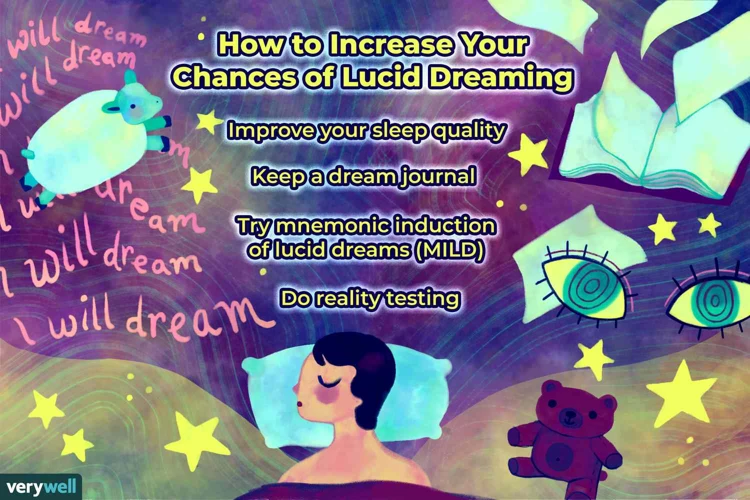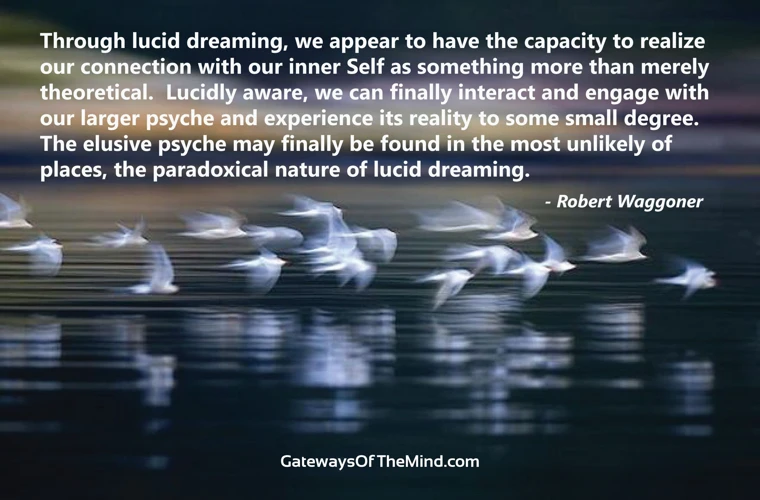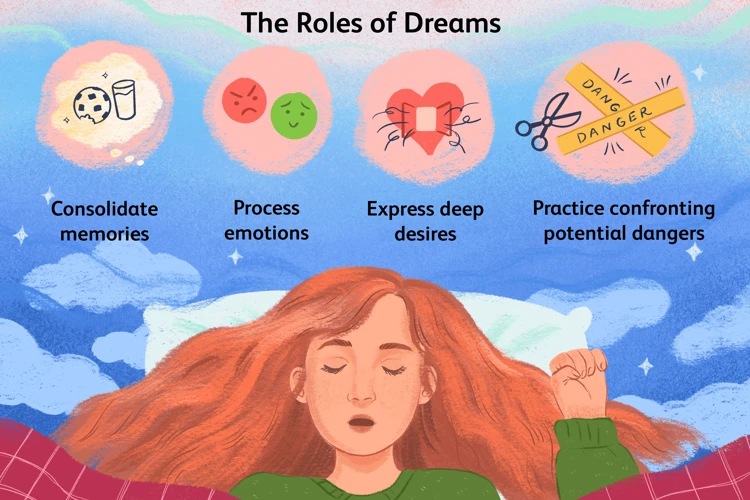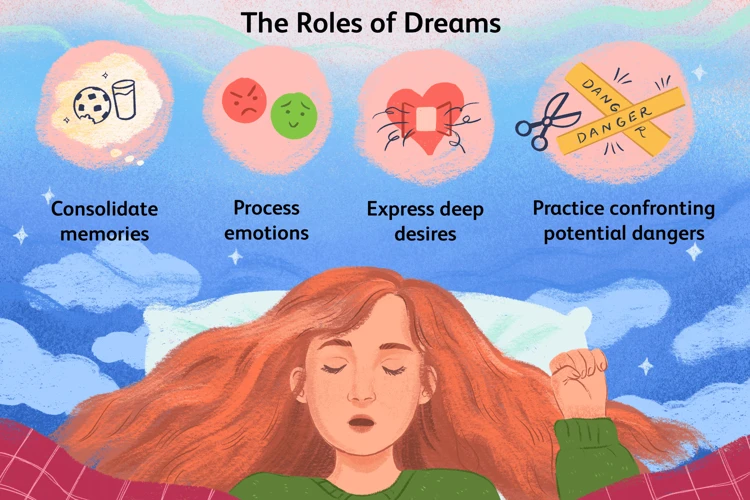Imagine being trapped in a world where your worst nightmares come alive, but with an unsettling twist: you are fully aware that you are dreaming. These haunting experiences, known as lucid nightmares, plunge individuals into a state of simultaneous fear and fascination. With their vivid and realistic qualities, lucid nightmares blur the line between the dream world and reality, leaving a psychological impact that can be both profound and long-lasting. In this article, we will delve into the intriguing phenomenon of lucid nightmares, exploring their unique characteristics and the profound effects they can have on individuals’ mental well-being. Join us as we unravel the psychological complexities hidden within this perplexing realm.
What are Lucid Nightmares?

Lucid nightmares are a unique type of dream where individuals become aware that they are dreaming while experiencing intense fear or anxiety. Unlike regular nightmares, where the dreamer is passive and unaware of the dream state, lucid nightmares grant individuals a strange sense of consciousness within the dream world. This heightened self-awareness allows individuals to recognize the terrifying nature of their dreams and, in some cases, exert some control over the dream’s outcome. Lucid nightmares are often characterized by their vivid and realistic qualities, making them indistinguishable from waking life. People who experience lucid nightmares often describe a perplexing blend of fear and fascination as they navigate through these unsettling dreamscapes. It is essential to note that lucid nightmares can differ from sleep disorders like night terrors or sleep paralysis, although there may be a connection between them. Understanding the nature of lucid nightmares is crucial in exploring their psychological impact and finding effective coping strategies.
The Experience of Lucid Nightmares

The experience of lucid nightmares is a fascinating blend of vivid and realistic dreams, heightened awareness of the dream state, and the potential for dream control. During lucid nightmares, individuals find themselves immersed in dreams that feel as real as waking life, with sharp sensory details and intricate storylines. They may encounter terrifying scenarios, facing fears and anxieties head-on. The distinguishing feature of lucid nightmares is the individual’s awareness that they are dreaming, which sets them apart from regular nightmares. This self-awareness creates a unique psychological experience, as individuals grapple with the paradoxical feeling of being trapped in their own minds while also having a semblance of control over the dream. The experience of lucid nightmares can vary from person to person, and understanding their intricate nature is essential in comprehending their psychological impact.
1. Vivid and Realistic Dreams
One of the defining aspects of lucid nightmares is the vivid and realistic nature of the dreams. When individuals experience lucid nightmares, the dream world feels incredibly lifelike, often blurring the boundaries between their dreams and reality. The details within these dreams are exceptionally vivid, including sensory perceptions such as touch, taste, smell, and sound. It is as if the nightmare is unfolding right in front of their eyes, evoking a strong emotional response. The realism of these dreams can be incredibly distressing, as the dreamer may struggle to distinguish between what is happening in the dream and what is happening in waking life. This intense level of realism adds an extra layer of perplexity to the already unsettling experience of lucid nightmares. Despite the distress they can cause, some researchers speculate that lucid nightmares may have potential benefits for personal growth and self-exploration. However, it is essential to recognize and address the potential psychological impact these vivid and realistic dreams can have on individuals’ well-being. (source: potential benefits of lucid nightmares for growth and self-exploration)
2. Awareness of Dream State
The second characteristic of lucid nightmares is the awareness of the dream state. Unlike regular dreams where individuals may passively experience the events without any consciousness of it being a dream, in lucid nightmares, there is a profound realization that the experience is not real. This awareness adds an extra layer of complexity to the already intense emotions elicited by the nightmare. People who have lucid nightmares often describe a sense of being trapped between the realms of wakefulness and sleep, oscillating between the knowledge that it’s just a dream and the discomforting illusion of reality. This heightened state of awareness in lucid nightmares can be both unsettling and intriguing, blurring the boundaries between the dream world and consciousness. While researchers continue to explore the /connection-lucid-dreaming-nightmares/ (connection between lucid dreaming and nightmares), it is clear that the distinct awareness of the dream state plays an essential role in the unique experience of lucid nightmares.
3. Ability to Control the Dream
One intriguing aspect of lucid nightmares is the ability to exert control over the dream. Unlike regular nightmares where the dreamer is a passive observer, individuals experiencing lucid nightmares have the unique capacity to manipulate the dream environment, alter events, or even confront their fears head-on. This ability to control the dream can be empowering but also unsettling, as it blurs the line between the dream world and reality. Some individuals may find solace in the fact that they can influence the outcome of their lucid nightmares, using this as a potential tool for self-exploration and personal growth. However, it is important to note that not everyone can easily harness this control, and for some, it may be challenging to navigate and shape the dreamscapes they find themselves in. The connection between lucid dreaming and sleep disorders is still being explored, and there might be a relationship between the two.
The Psychological Impact

The psychological impact of lucid nightmares can be profound and wide-ranging, affecting various aspects of an individual’s mental well-being. One common consequence of lucid nightmares is increased anxiety and fear. The intense and vivid nature of these dreams can leave individuals feeling unsettled, anxious, and even fearful of falling asleep. Repeated exposure to terrifying dream scenarios can lead to trauma and post-traumatic stress, impacting a person’s overall quality of life. Sleep disorders and insomnia may also accompany lucid nightmares, as the fear of experiencing these unsettling dreams can disrupt normal sleep patterns. The combination of fear, lack of quality sleep, and the uncertain boundary between dreams and reality can contribute to feelings of depression and negative mood. It is crucial to understand the psychological effects of lucid nightmares in order to develop effective coping strategies and support individuals in their journey towards restful sleep and mental well-being. For those interested, there is a potential link between lucid nightmares and sleep disorders that may shed further light on the topic.
1. Increased Anxiety and Fear
One of the most prominent psychological impacts of lucid nightmares is the heightened anxiety and fear experienced by individuals during and after these dreams. Unlike ordinary nightmares where the dreamer may wake up feeling relieved, the presence of lucidity in nightmares intensifies the emotions felt within the dream state. The vivid and realistic nature of lucid nightmares can make the fear and terror feel truly palpable, as if they are happening in real life. This can lead to a lingering sense of unease, even after waking up. The increased anxiety and fear stemming from lucid nightmares can have a significant impact on individuals’ overall well-being, affecting their daily lives, relationships, and overall mental health. It is important to address and manage these emotions to minimize their long-term effects. Understanding the possible link between lucid nightmares and sleep disorders can provide valuable insights into effective coping mechanisms to alleviate anxiety and fear.
2. Trauma and Post-Traumatic Stress
Lucid nightmares can have a significant impact on individuals who have experienced trauma or suffer from post-traumatic stress disorder (PTSD). Trauma can manifest in various ways, including recurring nightmares that may become lucid in nature. In these cases, individuals may find themselves reliving distressing events or situations during their dreams. The experience of reliving trauma can exacerbate existing symptoms of anxiety and fear, making it challenging for individuals to cope with their daily lives. Additionally, lucid nightmares may intensify feelings of helplessness and vulnerability, further contributing to the psychological distress associated with trauma and PTSD. It is important to seek professional support and therapy to address these underlying issues and develop coping mechanisms to manage the impact of lucid nightmares in the context of trauma and post-traumatic stress. Understanding the link between lucid nightmares, trauma, and PTSD is crucial in providing effective and targeted interventions for individuals experiencing these challenges. For more information on the connection between lucid nightmares and sleep disorders, please refer to the link here.
3. Sleep Disorders and Insomnia
Sleep Disorders and Insomnia
Lucid nightmares can be closely linked to sleep disorders and insomnia, further exacerbating the psychological impact they have on individuals. Sleep disorders refer to disruptions in normal sleeping patterns that can significantly affect the quality and duration of sleep. Insomnia, in particular, is a common sleep disorder characterized by difficulty falling asleep, staying asleep, or experiencing non-restorative sleep. The presence of lucid nightmares can contribute to the development or worsening of sleep disorders and insomnia in several ways:
- Disrupted Sleep Architecture: Lucid nightmares can disrupt the natural sleep architecture, preventing individuals from entering deep, restorative sleep stages like REM (rapid eye movement) sleep. This can lead to fragmented and poor-quality sleep, making it harder to achieve restful and rejuvenating sleep.
- Heightened Anxiety and Hyperarousal: Lucid nightmares often induce intense fear, anxiety, and hyperarousal during sleep. These heightened emotional states can linger even after waking up, making it difficult for individuals to relax and fall back asleep, further contributing to insomnia.
- Increased Nighttime Awakenings: Lucid nightmares can cause individuals to wake up multiple times during the night. The distressing nature of these dreams can make it challenging to go back to sleep, resulting in interrupted sleep and exacerbating the symptoms of insomnia.
- Reversed Sleep-Wake Schedule: The fear of experiencing lucid nightmares can lead to a fear of going to sleep altogether. This fear can disrupt the sleep-wake schedule, causing individuals to stay awake for extended periods, leading to sleep deprivation and further sleep disturbances.
Addressing the sleep disorders and insomnia linked to lucid nightmares is crucial to improving overall sleep quality and managing the psychological impact of these vivid and unsettling dreams. Seeking professional help, practicing good sleep hygiene, and exploring relaxation techniques can be effective strategies in restoring healthy sleep patterns and minimizing the negative consequences of sleep disorders exacerbated by lucid nightmares.
4. Depression and Negative Mood
Lucid nightmares can have a significant impact on an individual’s mental health, leading to feelings of depression and a negative mood. The intense fear and anxiety experienced during these nightmares can linger long after waking up, causing a shift in a person’s overall mood and emotional state. The distressing and vivid nature of lucid nightmares can lead to persistent negative thoughts and feelings throughout the day, affecting one’s sense of well-being and emotional stability. Recurrent lucid nightmares can contribute to a cycle of negative emotions, as the fear of experiencing another frightening dream can create a sense of anticipatory anxiety and dread.
Individuals who already have a predisposition to depression or those who have experienced trauma may be more vulnerable to the emotional impact of lucid nightmares. Their depressive symptoms may be exacerbated or triggered by the distressing content of these dreams. The disrupted sleep patterns caused by lucid nightmares can also contribute to feelings of fatigue, low energy, and decreased motivation, which are common symptoms of depression.
It is important for individuals experiencing depression and negative mood as a result of lucid nightmares to seek support and professional help. Cognitive-behavioral therapy (CBT) and other evidence-based treatments can be effective in addressing the underlying causes of depression and developing coping strategies to manage both the nightmares and the associated mood disturbances. By addressing the psychological impact of lucid nightmares, individuals can take proactive steps towards restoring their mental well-being and overall quality of life.
Causes of Lucid Nightmares

Several factors can contribute to the occurrence of lucid nightmares, ranging from psychological to physiological causes. Stress and trauma are commonly associated with the onset of lucid nightmares. The intense emotional experiences from past traumatic events can infiltrate dreams and heighten the sense of fear and anxiety. Medications and substance abuse, especially those that affect the central nervous system, can disrupt sleep patterns and contribute to the development of lucid nightmares. Sleep disorders, such as sleep apnea or insomnia, can also disrupt the normal sleep cycle and increase the likelihood of experiencing lucid nightmares. Additionally, underlying mental health conditions, such as anxiety disorders or post-traumatic stress disorder, can make individuals more susceptible to lucid nightmares. It is worth noting that the causes of lucid nightmares can vary from person to person, and a combination of factors may contribute to their occurrence.
1. Stress and Trauma
- Stress: Stress is a common trigger for lucid nightmares. When individuals experience high levels of stress, their subconscious mind may manifest these anxieties in the form of intense and vivid dreams. The pressure from work, relationships, or other life challenges can infiltrate the dream state, leading to unsettling and distressing experiences.
- Trauma: Traumatic events, such as accidents, abuse, or witnessing violence, can also contribute to the occurrence of lucid nightmares. The emotional impact of trauma can linger in the subconscious mind, causing nightmares to serve as a way for the mind to process and cope with the distressing memories. These nightmares may replay the traumatic event or incorporate elements related to the trauma, intensifying emotional responses during sleep.
Both stress and trauma can disrupt the normal sleep cycle and impair the quality of sleep, making individuals more susceptible to experiencing lucid nightmares. It is important to address and manage sources of stress and trauma in order to minimize the occurrence of lucid nightmares and improve overall sleep quality.
2. Medications and Substance Abuse
Medications and substance abuse can significantly contribute to the occurrence of lucid nightmares. Certain medications, such as antidepressants, antipsychotics, and sleep aids, have been known to alter the sleep cycle and increase the likelihood of vivid and disturbing dreams. These alterations in REM sleep can create fertile ground for lucid nightmares to take root. Substance abuse, particularly with drugs like alcohol, marijuana, and hallucinogens, can also disrupt the sleep cycle and lead to intense and unsettling dreams. It’s important to note that the use of certain medications or substances does not guarantee the occurrence of lucid nightmares, but rather increases the risk. Additionally, the combination of certain medications or substances can amplify the likelihood of experiencing lucid nightmares. If you suspect that a medication or substance is contributing to your lucid nightmares, it is crucial to consult with a healthcare professional who can assess your situation and make the necessary adjustments to your treatment plan.
3. Sleep Disorders
Sleep disorders have been linked to the occurrence of lucid nightmares, contributing to their frequency and intensity. Several sleep disorders can disrupt the sleep cycles and increase the likelihood of experiencing lucid nightmares, exacerbating the psychological impact. Let’s explore some of these sleep disorders:
- Night Terrors: Night terrors, also known as sleep terrors, are a type of parasomnia characterized by sudden episodes of extreme fear and panic during sleep. These episodes can lead to lucid nightmares, as the individual may become aware of their terrifying dream state.
- Sleep Paralysis: Sleep paralysis is a phenomenon where the person is temporarily unable to move or speak while falling asleep or waking up. Sleep paralysis is often accompanied by hallucinations and a feeling of intense dread, which can transition into lucid nightmares.
- Narcolepsy: Narcolepsy is a neurological disorder that disrupts the normal sleep cycle, causing excessive daytime sleepiness and sudden episodes of sleep, known as “sleep attacks.” Individuals with narcolepsy may experience lucid nightmares during their disrupted sleep patterns.
- REM Sleep Behavior Disorder (RBD): RBD is a condition where individuals physically act out their dreams, potentially leading to aggressive or violent behavior during sleep. This disorder can increase the occurrence of lucid nightmares due to the intense physicality involved.
It is important to seek professional help and diagnosis if you suspect a sleep disorder may be contributing to your lucid nightmares. By understanding the connection between sleep disorders and lucid nightmares, individuals can seek appropriate treatment and develop coping strategies to alleviate the psychological impact.
4. Underlying Mental Health Conditions
- Anxiety Disorders: Conditions like generalized anxiety disorder (GAD), panic disorder, or post-traumatic stress disorder (PTSD) can contribute to the development of lucid nightmares. The heightened levels of anxiety and stress associated with these disorders can manifest as intense and distressing dream experiences.
- Depressive Disorders: Depression can disrupt sleep patterns and lead to more frequent and intense nightmares, including lucid nightmares. The negative emotions and thoughts associated with depression can seep into dream content, exacerbating the psychological impact.
- Psychotic Disorders: Psychotic disorders, such as schizophrenia, can involve disturbances in perception and reality. These disturbances can extend into dreams, resulting in lucid nightmares that reflect the individual’s distorted perception and beliefs.
- Substance Use Disorders: Substance abuse and addiction can disrupt normal sleep patterns and contribute to the occurrence of lucid nightmares. Psychoactive substances, like alcohol, drugs, or certain medications, can alter brain chemistry and intensify dream experiences.
It is important to note that while mental health conditions can contribute to lucid nightmares, the relationship is complex and multifaceted. Not everyone with an underlying mental health condition will experience lucid nightmares, and not all individuals who experience lucid nightmares have a diagnosed mental health condition. It is essential to seek professional help for accurate diagnosis and appropriate treatment if underlying mental health conditions are suspected.
Coping Strategies for Lucid Nightmares
When faced with the distressing and disruptive experiences of lucid nightmares, there are several coping strategies that individuals can employ to help manage and mitigate the psychological impact. One effective strategy is reality testing and anchoring techniques, where individuals consciously check the reality of their surroundings during waking life to establish a sense of stability and reassurance. By grounding themselves in the present moment, they can alleviate the lingering fear and unease from their lucid nightmares. Another approach is lucid dreaming training, which involves learning techniques to become more proficient at recognizing and controlling dreams. With practice, individuals can gain the ability to change the narrative and dynamics of their lucid nightmares, transforming them into more positive or neutral experiences. Creating a peaceful sleep environment is also crucial, as a calming atmosphere can help reduce anxiety and promote restful sleep. This includes implementing regular sleep routines, optimizing the bedroom space, and practicing relaxation techniques before bed. Lastly, when coping strategies alone may not be sufficient, seeking professional help from therapists or sleep specialists experienced in dream analysis and trauma therapy can provide invaluable guidance and support. By addressing the underlying causes and working through the psychological impact of lucid nightmares, individuals can gradually reclaim a sense of control over their dreams and overall well-being.
1. Reality Testing and Anchoring Techniques
Reality testing and anchoring techniques can be helpful strategies for individuals experiencing lucid nightmares. These techniques aim to establish a firm connection with reality and provide a sense of stability during the dream state. One technique is to carry out reality checks throughout the day, such as looking at the time or trying to read something. By making these checks a habit, individuals may train their minds to perform them in their dreams, leading to an increased awareness of the dream state. Another approach is anchoring, which involves focusing on a specific object or sensation. This could be a personal item, like a favorite piece of jewelry, or a physical sensation, such as touching a solid surface or rubbing hands together. The purpose of anchoring is to offer a grounding point, reminding individuals they are in control and present in the dream. Together, these reality testing and anchoring techniques can provide individuals with a sense of stability and control during their lucid nightmares, potentially reducing anxiety and fear.
2. Lucid Dreaming Training
Lucid dreaming training is one approach that individuals can explore to cope with and potentially control lucid nightmares. This specialized form of training aims to enhance one’s ability to become aware within their dreams and exert control over the dream narrative. Here are some techniques commonly used in lucid dreaming training:
1. Reality testing: This technique involves performing regular reality checks throughout the day to develop a habit of questioning whether one is in a dream or reality. Examples of reality checks include looking at clocks, trying to push a finger through the palm of the hand, or questioning the nature of one’s surroundings.
2. Journaling: Keeping a dream journal is a fundamental aspect of lucid dreaming training. By writing down dreams immediately upon waking, individuals can improve their dream recall and identify recurring themes or patterns. This awareness can eventually carry over into the dream state, increasing the likelihood of recognizing a dream and achieving lucidity.
3. Meditation and mindfulness: Practicing meditation and mindfulness in daily life can promote a state of heightened awareness, which may translate into the dream state. By cultivating present moment awareness and observing thoughts and sensations without judgment, individuals can enhance their overall self-awareness and potentially carry these skills into their dreams.
4. Reality anchoring techniques: Anchoring techniques involve focusing on a specific object or thought before sleep, with the intention of recalling and reinforcing that anchor within the dream. This can help individuals maintain lucidity and stabilize their dreams when they become aware of the dream state.
5. Lucid dreaming supplements and technologies: Some individuals may explore the use of specific supplements or technologies designed to induce lucid dreams. These can include certain herbs, supplements, or devices that monitor sleep patterns and provide cues or stimuli within the dream to aid in lucidity.
It is important to note that lucid dreaming training requires patience and dedication, as it can take time to achieve consistent results. However, with practice and perseverance, individuals may be able to transform their lucid nightmares into opportunities for self-exploration and personal growth.
3. Creating a Peaceful Sleep Environment
A peaceful sleep environment plays a significant role in managing lucid nightmares. Creating a calming atmosphere can help promote relaxation and reduce the likelihood of intense dreams or nightmares. Here are a few strategies that individuals can implement to establish a peaceful sleep environment:
1. Optimize the Bedroom: Ensure that the bedroom is conducive to sleep by keeping it clean, decluttered, and comfortable. Use soothing colors and soft lighting to create a serene atmosphere that promotes relaxation.
2. Eliminate Distractions: Remove any electronic devices, such as televisions and smartphones, from the bedroom. These devices can disrupt sleep patterns and increase the likelihood of vivid dreams. Instead, consider reading a book or practicing relaxation techniques before bed.
3. Establish a Bedtime Routine: Develop a consistent bedtime routine to signal to the body and mind that it is time to wind down. Engage in relaxing activities, such as taking a warm bath, practicing mindfulness or meditation, or listening to gentle music.
4. Manage External Stimuli: Minimize disruptive noises by using earplugs or a white noise machine. Additionally, consider using light-blocking curtains or an eye mask to create a darker sleep environment, as light can interfere with sleep quality.
5. Ensure Comfortable Bedding: Invest in a comfortable mattress, pillows, and bedding that support healthy sleep. Finding the right level of firmness and ensuring proper temperature regulation can significantly improve sleep quality.
6. Consider Aromatherapy: Some individuals find that certain scents, such as lavender or chamomile, can promote relaxation and reduce anxiety before sleep. Experiment with aromatherapy diffusers or sprays to see if they have a calming effect.
By implementing these strategies and creating a peaceful sleep environment, individuals can improve their overall sleep quality and potentially reduce the frequency or intensity of lucid nightmares. Remember, it is essential to find what works best for you and to be consistent with your sleep routine for optimal results.
4. Seeking Professional Help
For those who are struggling with the psychological impact of lucid nightmares, seeking professional help can be a valuable and effective approach to finding relief and improving overall well-being. Mental health professionals, such as therapists or psychologists, can provide guidance and support tailored to individual needs. Here are some reasons why seeking professional help can be beneficial:
1. Expertise: Mental health professionals have the knowledge and expertise to understand and address the complex psychological factors contributing to lucid nightmares. They can help identify underlying causes, such as trauma or underlying mental health conditions, and develop personalized treatment plans.
2. Therapeutic Techniques: Professionals can employ various therapeutic techniques to manage and alleviate the emotional distress caused by lucid nightmares. These may include cognitive-behavioral therapy (CBT), exposure therapy, or eye movement desensitization and reprocessing (EMDR). Therapy sessions can provide a safe space for individuals to explore their fears and develop coping strategies.
3. Medication: In some cases, medication may be prescribed to manage the symptoms associated with lucid nightmares. Psychiatrists or other qualified medical professionals can evaluate the need for medications and monitor their usage to ensure optimal effectiveness and minimize side effects.
4. Support and Validation: Perhaps one of the most significant benefits of seeking professional help is the support and validation individuals receive. Therapists provide a non-judgmental environment where individuals can openly discuss their experiences, fears, and emotions related to lucid nightmares. This support can help individuals feel understood and empowered, reducing feelings of loneliness and isolation.
Remember, seeking professional help is a courageous step towards taking control of one’s mental health and finding relief from the psychological impact of lucid nightmares. It is important to consult with a qualified professional to determine the most appropriate course of action for individual circumstances.
Conclusion
In conclusion, lucid nightmares present a fascinating and complex psychological phenomenon that can have a significant impact on individuals’ well-being. These vivid and realistic dreams, combined with the awareness of the dream state, create a unique and often distressing experience for those who encounter them. The psychological impact of lucid nightmares can manifest as increased anxiety, fear, trauma, sleep disorders, and even depression. It is crucial to understand the potential causes of lucid nightmares, such as stress, trauma, medications, and underlying mental health conditions, in order to develop effective coping strategies. While reality testing, lucid dreaming training, creating a peaceful sleep environment, and seeking professional help are all viable methods for managing lucid nightmares, further research is needed to fully comprehend and address the complexities of this phenomenon. Despite their unsettling nature, lucid nightmares also offer opportunities for self-exploration and personal growth. Exploring the potential benefits and connections between lucid nightmares and other sleep disorders may shed light on new avenues for understanding and managing these intriguing experiences.
Frequently Asked Questions
1. What is the difference between a regular nightmare and a lucid nightmare?
A regular nightmare is a dream where the dreamer is unaware that they are dreaming and typically lacks control over the dream. In contrast, a lucid nightmare is a dream where the individual is aware they are dreaming but experiences intense fear or anxiety.
2. Can lucid nightmares be beneficial in any way?
While lucid nightmares can be distressing, they can also provide opportunities for personal growth and self-exploration. Some individuals have reported using lucid nightmares as a means of confronting their fears or uncovering subconscious issues.
3. How can someone differentiate between a lucid nightmare and sleep disorders like night terrors or sleep paralysis?
Lucid nightmares and sleep disorders like night terrors or sleep paralysis have distinct characteristics. Lucid nightmares involve awareness of the dream state and the ability to control aspects of the dream, while sleep disorders often involve physical sensations and an inability to move or speak during episodes.
4. Can lucid nightmares be triggered by external factors?
Yes, external factors such as stress, trauma, medications, substance abuse, and sleep disorders can increase the likelihood of experiencing lucid nightmares.
5. Are there any connections between lucid dreaming and lucid nightmares?
Lucid dreaming and lucid nightmares share the common aspect of awareness during dreams. While lucid dreaming involves a sense of control and positive experiences, lucid nightmares are characterized by fear and anxiety.
6. What psychological impact can lucid nightmares have on individuals?
Lucid nightmares can lead to increased anxiety, fear, trauma, post-traumatic stress, sleep disorders, insomnia, and negative mood states such as depression. The distress caused by recurring lucid nightmares can significantly impact an individual’s mental well-being.
7. Are there coping strategies for dealing with lucid nightmares?
Yes, there are coping strategies that can help manage lucid nightmares. These include reality testing and anchoring techniques, lucid dreaming training, creating a peaceful sleep environment, and seeking professional help if needed.
8. Can medication help with lucid nightmares?
Medication can sometimes be prescribed to help manage the underlying conditions that contribute to lucid nightmares, such as anxiety or sleep disorders. However, it is important to consult with a healthcare professional for a proper evaluation and guidance.
9. Do all lucid nightmares have a traumatic nature?
No, not all lucid nightmares are inherently traumatic. However, their vivid and intense nature can make them distressing for individuals, causing significant psychological distress.
10. Can lucid nightmares be completely eliminated?
While it may not be possible to completely eliminate lucid nightmares for everyone, individuals can learn coping strategies to reduce the frequency and intensity of these experiences, leading to better sleep and improved overall well-being.








